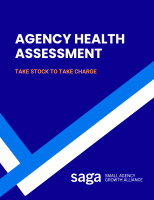It’s hard to get around the fact that what agencies sell – in a transactional sense – is time. But that doesn’t mean that it should be front-and-center in your business development conversations or your contracts with clients.
In fact, the more you talk about time, the more problems you may end up creating.
Yet many agencies not only talk about time too much, they often frame it in the wrong way.
Let’s take a look at a few key principles to follow when talking about time with your prospects and clients.
Don’t show an hourly rate unless you charge by the hour
I’m not sure why agencies seem to like to quote an hourly rate in their proposals when there’s no provision in there to ever charge that amount.
If you are billing by the hour, you obviously need to include the hourly rate to help the prospect understand what they are agreeing to. Similarly, if you offer up a certain amount of fixed-fee work and anything beyond that requires an hourly charge, you need to disclose it.
However, if you have an agreement that is all based on flat fees or non-hourly retainers, there is no reason to have any discussion of what your “hourly rate” might be. Why provide the prospect something to focus on that is not relevant to their actual decision-making process?
Don’t provide time estimates if you don’t have a hard cap
Many agency proposals include estimates for the amount of time that it might take the team to build a landing page, draft a press release, or engage in some other portion of the work.
Yet the proposal does nothing to cap the amount of time that the agency would spend, let alone include a provision to charge for anything above and beyond that estimate.
By offering up an estimate of how much work it will take to accomplish a task, some agencies think that it will show the prospect how much effort they will be putting into the project.
Yet what you have done is given the would-be client the chance to calculate your effective hourly rate and decide if it is a good deal or not. Worse, they can quibble over whether it really should take as much time as you claim to get a certain bit of work done.
Don’t invite senseless discussion and negotiation over points that don’t impact what you will do or what you need to charge.
Don’t allow monthly hours to “roll over” and accumulate endlessly
One of the most dangerous things that an agency can do with regard to talking about time in fixed-price agreements is to allow for unused hours to roll over.
You are not a mobile phone provider. When your client buys a bucket of hours from you they need to do so within a set window of time because you need to set aside team capacity to fulfill their requests.
When you allow hours to carry over to future months, you have taken the hit by keeping your team idle and ready to serve the client – and now must reserve even more time in the future.
Even worse is when the roll over amount and time periods are not capped. I have even seen cases where agencies found themselves on the hook for large amounts of work well after the work was paid for (and the time had already been set aside).
Think of it this way: if you buy a ticket to a sporting event, you can’t simply decide at the last minute not to show up and then want to go to another game of your choosing at no extra cost. Your seat had already been reserved, just as you have done with your team’s time for the client who didn’t “spend” their monthly hours.
Know when – and how – to bill by the hour
Unlike some agency growth consultants, I’m not opposed to billing by the hour when it is appropriate.
If you have no idea how much work it will take to complete a particular task, the least risky approach for both parties can be an hourly billing arrangement. This is especially true for things like crisis communications that are inherently unpredictable.
Hourly billing can also be a helpful fallback for when ad hoc projects come up during the course of an engagement that don’t fall within the initial scope but aren’t big enough to require a new agreement to be struck.
Finally, offering to charge hourly for small bits of work can also be a useful tool to help manage scope creep since many clients will decline to pay those bits, but at least they had the option instead of you simply telling them you can’t do it since it is not part of the original agreement.
If you are going to charge by the hour, though, you need to have the correct systems in place to track (and bill) that time effectively. Many agencies claim hourly rates but don’t capture all of the work – which means that they have undercharged and effectively discounted their hourly rates.
Value your team’s time appropriately
Whether you bill by the hour or not, you need to understand how to value your time and the time that your team spends working for your clients.
One of the reasons why hourly billing has such a bad reputation in the agency community is because most agencies don’t set hourly rates that reflect the actual value that they provide, let alone the cost of delivering that hour of work.
You need to have a process in place for understanding all of your costs – including labor and overhead expenses – so that you can recognize the actual cost of completing specific tasks and projects.
Once you know those numbers, you can add a reasonable amount of profit and land upon an effective hourly rate that allows you to properly quote work to prospective clients. That’s just as important whether you are doing so on a fixed fee or an hourly basis.
Even agencies that do this well in general often fall short in one key area: the owner’s own time. You need to ensure that you factor in the time that you spend working for a client and receive the compensation that you deserve for your own inputs. Not only is your time not free, it should be the most expensive time that your agency sells.
Conclusion
The largest expense for just about any agency is its labor costs. Yet many agencies don’t consider how they think about this time when selling to prospects and delivering services to clients.
If you adopt the mindsets outlined in this article, you will put yourself in a position to deliver effective results for clients and a price that delivers reasonable profits to your business. It will help you to avoid the potential pitfalls that come from treating time the wrong way, and reap the rewards from being smart about it.










